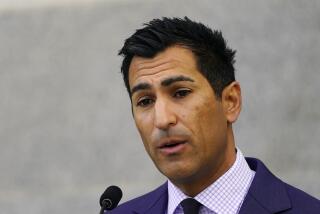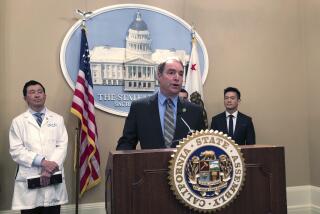Smoke Gets in Lawmakers’ Brains
- Share via
How much more evidence of the dangers of tobacco smoke do the members of the California Legislature need? Research published last week in the Journal of the American Medical Assn. provides the first biochemical proof that secondhand cigarette smoke affects unborn children. Doctors in Toronto have shown that tobacco’s toxic elements accumulate in the fetuses of women who do not smoke but who live or work with smokers.
Scientists have long linked smoking by pregnant women to a baby’s increased risk of low birth weight, prematurity, slow neurological development and sudden infant death syndrome. But researchers have had difficulty confirming that a fetus can be affected by secondhand smoke as well. The Canadian researchers measured the level of cotinine, a long-lasting byproduct of nicotine, in the hair of newborn babies and found that cotinine levels were twice as high in infants of so-called passive smokers as in those born to women not exposed to secondhand smoke.
Does this news worry cigarette manufacturers? Apparently not. A spokesman for the industry’s Tobacco Institute maintained that the Toronto study provides no evidence that there are long-term dangers for infants exposed to secondhand smoke.
But others see the mounting scientific evidence of the health risks posed by passive smoke as a call to action. Last week, U.S. Surgeon General Joycelyn Elders, citing a rise in smoking by teen-agers, issued a clear warning: “Tobacco addicts and it kills.” Also last week, McDonald’s Corp. announced that its 1,400 company-owned restaurants will be smoke-free. Arby’s last month banned smoking in its company-owned restaurants. The National Council of Chain Restaurants, of which McDonald’s is a member, endorsed a pending federal bill, introduced by Rep. Henry A. Waxman (D-Los Angeles), to ban smoking in most commercial buildings.
California should show the way by finally passing its own workplace smoking ban. That bill, sponsored by Assemblyman Terry B. Friedman (D-Brentwood), passed the Assembly last year but stalled in the Senate Judiciary Committee. Former committee chairman Bill Lockyer (D-Hayward), now Senate president, has been noncommittal on this reasonable bill. He should support it now; the Toronto results provide yet more evidence of how far beyond the smoker tobacco’s harm can reach.
More to Read
Get the L.A. Times Politics newsletter
Deeply reported insights into legislation, politics and policy from Sacramento, Washington and beyond. In your inbox twice per week.
You may occasionally receive promotional content from the Los Angeles Times.










